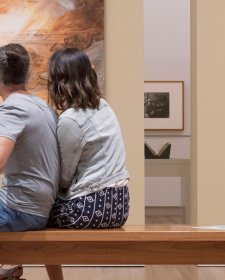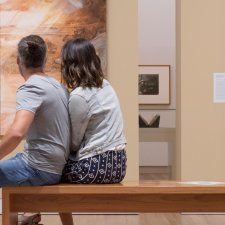Brett Canét-Gibson on making a portrait with Heath Bergersen.
- [Brett] I saw Heath in a show on the ABC "The Heights." He was acting. Came on screen, I was watching, it was probably what 15 episodes in that you appeared?
- Oh, that's right, yeah.
- And I was watching and I thought, oh my god. Look at that man. I have to photograph him. So I put a call out on Facebook and eventually I tracked him down, sent an email and said I want to enter Heath in the National Portrait Prize. And it went from there and we met and then I went around to Heath's place, and that's how it happened.
- Yeah, it was, it was the first for me so, yeah, thanks Brett.
- Did you like it?
- Oh yeah, yeah, yeah! And he got us a copy and we put that up. But you know, putting a photo up of yourself, Sort of wasn't long before I took it down. Sort of your own best employee of the month or something, you know? Oh, sort of, I'm good. Oh, who's that?
- It's-
- But, but, yes. No, it was-
- It's for them.
- Yes, mum did love it. Mum was like, "Hey, where'd that go?" No, I'm put it away. Yeah, we got paintings and stuff there, but, but yes, no, I did.
- [Brett] Yeah. Good. Because there's always, that's another really interesting point because you'd never really know. Like when I see a subject on the street cause I photograph, I go, I can see that person in the portrait, but you'd never really know if the person is overwhelmed with it or likes it or doesn't-
- Oh sure.
- like the way they look and stuff like that. So you very rarely find out. I keep in contact and always send a copy-
- Uh, yeah.
- to people that I photograph, but you never get the honest feedback, which is quite fascinating cause you don't know whether you hit the target. I know I got it for me.
- Yeah.
- Of you.
- But I don't know-
- I think so, yeah, for me as well.
- Yeah.
- When I look at it, so sort of reminds me like a wild black fella or something, you know like cause you're getting me to do a certain look.
- Yeah.
- And I suppose from the acting background as well it wasn't just taking still shots like for theatre and stuff like that. So like different expressions which we sort of directed me through that as well. Just, I think we did a couple of smiley ones just some serious ones and-
- [Brett] Yeah.
- So you've sort of directed me.
- [Brett] Yeah.
- Which really helped as well.
- [Brett] But there's a when you say wild black fella, I see a natural engaged-
- [Heath] Oh right
- [Brett] Being.
- [Heath] Yep.
- [Brett] Right?
- And, that view just sitting there looking at me see when I photograph too, like I there's a little bit of direction, but my what I try to do is get out of the way. I try and get out of the way between you as a sitter and the viewer. So my thing is to just not get in the way.
- Sure.
- By odd head positions or funny poses or stuff like that. So that's my goal when I'm photographing. Just to dissolve somehow.
- Yeah, sure. Okay.
- [Brett] My influence, big influence for me is around 1850. 1850 Paris Nadar portraiture. Very simple. If you look at those images from around that period and Daguerreotypes and beyond that it's, you can see remnants of my images in there and it's, they're usually wearing black. It's a dark background it's natural light and it's very direct. When I first went back to study, I found myself in the studio shooting portraits and I knew I was gonna be a portrait photographer so I loved the meeting people and photographing faces but it was with the black background, black clothes, and the same thing. So, I haven't moved away in 30 years from doing the same thing. Like I can chart it all the way back on little 35mm negs, badly exposed, you know.
- But, so that simplicity of just engaging and just becoming almost like a mirror that I'd try and hold up and then that person there, and it's reflected back into it, it's a really hard discipline to do because you there's nowhere to hide. If you get it wrong, it's wrong. And I, there's like, you have a handful of images that you go back to and they're really good and you love, and there's a handful of images that just don't get there. And you never know why. Like I can go out on a day and photograph someone and then meet someone else and do the same process and the same thing and the same light and whatever it is, there's no connection there. And it's not through my fault or the person sitting there, it's, there's a real, I don't know, the magic happens. I don't know how to explain it. Guess I'm lost for words. So, when that happens and you see it in the camera, you go, oh my god, there it is, I've got it. So that simplicity, it's almost like you put a set of boundaries on yourself. Daylight, black background, black clothes direct, front and centre. And just let the, the person come out. Even though, I don't know, like people say, "Oh, you can almost see their soul." I don't know about that. I'm not looking for that. Really, with a lot of direction, there is not a lot of direction I give.
- Yep.
- Like, and there's a certain way where you get to the point where you go just looking straight towards me and then good and then I go a little bit quiet and you can almost wait for the person to go. You can almost see the sitter going, "What's happening? What's happening?" And then they, then you just wait and wait and wait and then you've got it. So there's a little bit of a delay there and giving directions and stuff like that. Especially people on the street. Cause when I work on the street, man I'm like tucked into sidewalks and things like that and people are walking past.
- [Heath] Yep.
- [Brett] And if you look at my portraits, they look like they're in the studio, but it's not, it's out in the street where daily public life is happening.
- Yeah. Outside.
- So that's why I always say, you know the city is my casting agency and the sidewalk is my studio.
- Cool.
- Cause that's where it happens. The magic. You were a little bit different. Cause I went your backyard.
- Yeah
- Yeah. Facebook is my casting agency and the backyard is my studio.
- Yeah. Nowadays a bit more so than.
- Yeah, I haven't seen it. So, next time I'm over-
- Oh, yeah.
- I'll have to drop in and have a look
- Cause did you actually go over when, or did you just submit it, or did you go to the Canberra?
- No, I, well here's a story. Shh, shh, don't tell them. But, I submitted for the National Portrait Prize and they didn't select it. And then they bought it.
- And then, yeah right, because on the wall.
- So I didn't get in that year.
- [Voice Offscreen] Why was that judged then?
- What happened, Jo?
Related information



The Gallery
Visit us, learn with us, support us or work with us! Here’s a range of information about planning your visit, our history and more!



Support your Portrait Gallery
We depend on your support to keep creating our programs, exhibitions, publications and building the amazing portrait collection!



Plan your visit
Information on location, accessibility and amenities.





